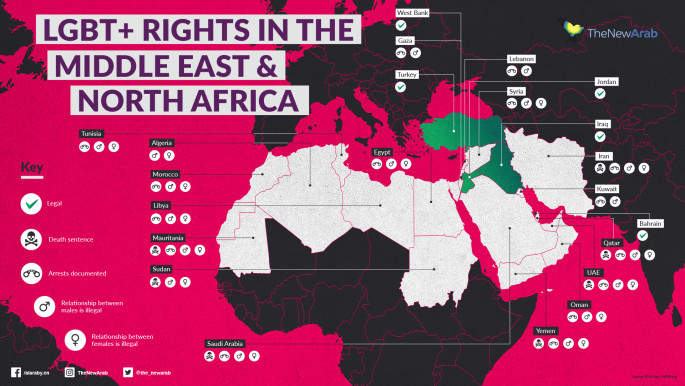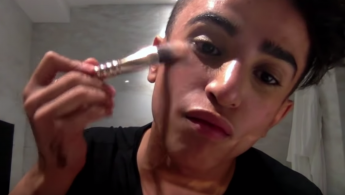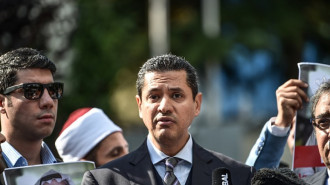Breadcrumb
Flamboyant Saudi influencer faces prison 'for wearing leopard-print shorts'
Suhail al-Jameel, 23 announced he was facing prison on his Snapchat account on Sunday after initially posting the picture of himself in leopard print shorts on Twitter.
"In 2019 LGBTQ are not welcome in Saudi Arabia, you must live in secret and can't live in peace. You want tourism but you won't give us freedoms," al-Jameel said to more than 170,000 Twitter followers.
"I take a photo of myself wearing shorts at the beach and I go to jail for wearing shorts. Then the police change my charges to electronic crimes for sharing photos of nudity. How am I nude if I am wearing shorts on a hot beach?"
The announcement prompted fans of the young social media star to rally for his release under the hashtag #freesuhail.
It is unclear how many years in prison he faces, although al-Jameel had previously been sentenced to three years in jail for posting another "compromising" image of himself with another person. His sentence was slashed in half after memorising verses of the Quran and avoided jail altogether after carrying out a list of recommendations.
The announcement came as the ultra-conservative kingdom launched a visa programme allowing holidaymakers from 49 countries to visit one of the world's most closed-off countries. For years, the only foreigners allowed into the country were mainly Muslim pilgrims and business people.
Twitter Post
|
"Opening Saudi Arabia to international tourists is a historic moment for our country," tourism chief Ahmed al-Khateeb said in a statement.
"Visitors will be surprised... by the treasures we have to share - five UNESCO World Heritage Sites, a vibrant local culture and breathtaking natural beauty."
Read more: Visiting Saudi Arabia? 19 things that are illegal for tourists
Khateeb said the kingdom will also ease its strict dress code for foreign women, allowing them to go without the body-shrouding abaya robe that is still mandatory public wear for Saudi women.
Foreign women, however, will be required to wear "modest clothing", he added, without elaborating.
Earlier this month, the ultraconservative kingdom hosted K-pop superstars BTS who were the first non-Arab artists to perform at a stadium concert in Saudi Arabia. The move was slammed by rights organisations which dubbed the performance as an attempt to "whitewash" the kingdom's rights abuses.
Using the twitter hashtag #BTSDontGo, fans and human rights activists urged the group not to go to Riyadh, using the hashtag to highlight Saudi Arabia's track record on human rights.
"This is such a bad business move this is really a big f*** you Saudi women, LGBTQ fans but also to Muslim fans especially what happening in Yemen… doesn't this contradict their message? Of love yourself?" one Twitter user said before the concert.
"The prince had someone executed, gay people are publicly whipped and thousands are tortured because they dare to speak out about the regime... this is not a good thing they are going here," another said.
Hard sell
In a rare move, Saudi Arabia last year began issuing temporary visas to visitors to attend sporting and cultural events in a bid to kick-start tourism.
But the austere kingdom, which forbids alcohol and has a strict social code, is seen by many as a hard sell for tourists.
Prince Mohammed is seeking to change that through a sweeping liberalisation drive that has brought new cinemas, mixed-gender concerts and sporting extravaganzas to Saudi Arabia.
International criticism of the kingdom's human rights record, including the gruesome murder last year of critic Jamal Khashoggi and a crackdown on female activists, could further put off foreign visitors, observers say.
Read more: What reform? The perils of the Saudi 'public decency' law
Saudi Arabia has splurged billions in an attempt to build a tourism industry from scratch.
In 2017, the kingdom announced a multi-billion dollar project to turn 50 islands and other pristine sites on the Red Sea into luxury resorts.
Last year, construction of Qiddiya "entertainment city" was launched near Riyadh, which would include high-end theme parks, motor sport facilities and a safari area.
The country is also developing historic sites such as the centuries-old Madaain Saleh, home to sandstone tombs of the same civilisation which built the Jordanian city of Petra.
 |
| [Click to enlarge] |
Follow us on Twitter: @The_NewArab






![Anthony Blinken speech [Getty] Anthony Blinken speech [Getty]](/sites/default/files/styles/image_684x385/public/media/images/6263436E-8ACD-4D3C-9055-25A7BE79DD5A.jpg?h=d1cb525d&itok=fLHmHCRG)
 Follow the Middle East's top stories in English at The New Arab on Google News
Follow the Middle East's top stories in English at The New Arab on Google News
![trump putin summit [getty] trump putin summit [getty]](/sites/default/files/styles/image_330x185/public/media/images/FC0BAC95-8593-4C01-91E0-A54F5BA9C681.jpg?h=d1cb525d&itok=VSb-ozsZ)

